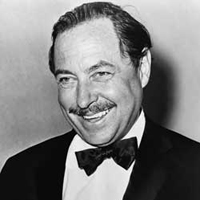Cat on a Hot Tin Roof by Tennessee Williams: Summary
Some years back, Brick Politt, Skipper, Margaret (Maggie) and Gladys Fitzgerald were college classmates. Brick and Skipper were football players. They had an abnormal sort of friendship, in the sense that they were too close, both being boys. The others used to accompany them to make it look normal. But, the college expelled Skipper, and Brick supported that act!

Tennessee Williams (1911-1983)
After college, Brick was injured in his spine and he became an announcer while Skipper still played. Maggie became a model. One summer, Brick suddenly decided to marry Maggie; he did so to prove the people that they were wrong to think that Brick was also a homosexual. But it also seems that he married Maggie to develop a distance with Skipper with whom he seems to have been afraid of developing an unnatural sexual relationship. Brick had a very satisfying sexual relation with Maggie for the first few months or so. But Maggie found that Skipper was still a threat to her relationship with Brick; so, she wanted to investigate the Brick-Skipper relationship. When she talked to Skipper, he proposed to prove that he was a normal heterosexual, and that he could prove it by having sex with her. She accepted to have an intercourse, but Skipper failed. That gave a shock to him. He began to take drugs and drink. Then he made a long distance telephone call to Brick in which he confessed that he was a homosexual because he failed to have sex with Maggie.
Skipper also proposed to Brick to come together and live as a homosexual pair. But Brick didn't reply. He didn't say whether he was also a similar man. He simply kept the phone. Now he claims that he and Skipper had done nothing unusual (except shaking hands), and also claims that he still believes in a pure platonic ideal (love without consideration of male or female partner). After that phone call, Brick started drinking heavily. He has stopped having sex with Maggie. In fact, he has forced Maggie to promise that she will stay with him without the demand of sexual relationship, family responsibility, or the likes. He has been doing nothing. He says he is disgusted by the society, the greed of the people around him, their tendency to tell lies and so on. He now lives with no aim, no interest, nothing. But he has a great desire for alcohol. He says he must drink and drink until something 'clicks' in his brain, and then he gets complete peace of mind. He went madly jumping in the school ground and broke his leg. He walks with crutches. He doesn't actually listen to anyone; he just hears them speak, and that too, not always. He casually responds, as he smiles alone, or sings alone to the moon. It is very difficult to make him talk about his past or present, why he drinks or refuses to live a normal social life, why he could neither accept nor frankly refuse Skipper as a homosexual partner, or just to make him participate in the minimum of family and social activities. His only justification is that he is disgusted by the mendacity of the society. But later, in his encounter with his father, we find that even that justification of his is mostly a lie: he has been hiding his own sense of guilt and disgust under that thin disguise of accusing on others.
At the end of the play, Maggie promised her father in law to gift him with a grandson fathered by Brick within one year. She did her best to change Brick from homosexual to heterosexual. Her last attempt gives some rays of sun.
Cat on a Hot Tin Roof Study Center
Maggie as a Cat in Cat on a Hot Tin Roof
The Maggie-Brick Relationship in Cat on a Hot Tin Roof
Sexual Struggle and Conflict in Cat on a Hot tin Roof
Illusion and the Grotesque in Cat on a Hot Tin Roof
Homosexuality the Problem in Brick in Cat on a Hot Tin Roof
Isolation and the Lack of Communication in Cat on a Hot Tin Roof
Cat on a Hot Tin Roof
Introduction of Cat on a Hot Tin Roof
Dramatic Technique in Cat on a Hot Tin Roof
Biography of Tennessee Williams
 |
bachelorandmaster.com |